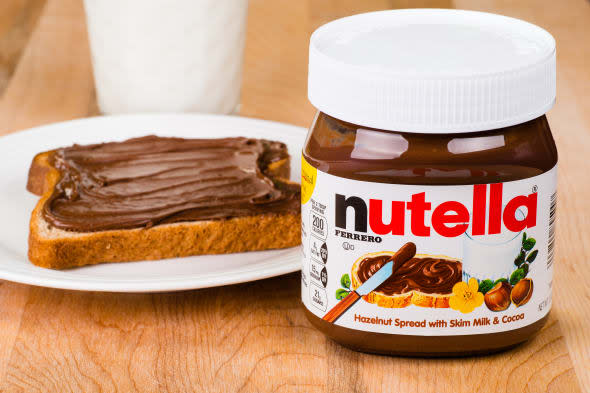The child who won't be called Nutella: what's in a name?

A French court has ruled that a baby girl couldn't be named Nutella. The judges wisely noted that it was 'The trade name of a spread', and therefore it was against the child's interest as it would lead to 'teasing or disparaging thoughts'. The parents didn't show up at court, so in their absence the judge named her Ella. In the UK we have far more freedom over the naming of children, but it begs the question of whether we should be allowed to do what we want.
Unusual names
In the absence of French-style controls, British children are given all sorts of outlandish names. A search to find the weirdest names in 2013 discovered that we're not averse to adopting a brand name, as there were babies called Boden, Pepsi and Dior. We're also fond of the downright bizarre - as Vogue, Puppy, Nirvana and Tea will testify. There was even one child called Reem - the Joey Essex catchphrase, and one called Tru.
Over the last few years there has been a trend to give children initials rather than names. So babies are born with the name TJ - that doesn't stand for anything: the actual name is TJ.
But while parents may feel that the freedom to name their child is a vital expression of their personality and taste, there are a number of studies that show that your name has a profound affect on your career opportunities further down the line.
%VIRTUAL-ArticleSidebar-jobs-guide%
Class
Gregory Clark, a sociologist and author of 'The Son Also Rises: Surnames and the History of Social Mobility' looked at the names of children who were most likely to go to Oxford between 2008 and 2013. The top ten names were straightforward, and in some cases fairly ancient names: Eleanor, Peter, Simon, Anna, Katherine, Elizabeth, Catherine, John, and Stephen.
The bottom ten names, meanwhile were Stacey, Connor, Bradley, Reece, Danny, Kayleigh, Jade, Paige, Shannon and Shane. He compared the likelihood of going to Oxford to the likelihood of having each name, and discovered that there were three times more Eleanors at Oxford than pure probability would dictate, and less than a 30th of the number of Jades.
However, Clark didn't put this purely down to name. He concluded that different names were popular among different social groups, and it was class, the background of parents, and their level of education which were influencing the results.
Education
However, it is difficult to assign responsibility for success so clearly. David Figlio of Northwestern University in Illinois broke down names into phonetic components and analysed the complexity of the names. He found that children with names that were more likely to have been given by poorly educated parents were treated differently at school: were less likely to be recommended for gifted classes and more likely to be classed as having learning difficulties.
He also looked at those from well-off families with names that sounded as though their parents were from a poorly educated background or had a low socioeconomic status. He found they also suffered. In families with one child with a posher sounding name than the other, the one with the lower class name did worse at school. He suggested this could be because of unconscious clues people were taking from their name, and the lower expectations they had as a result.
Jobs
A separate study in 2008 at Marquette University, found that people with more common names were more likely to be perceived as likeable, and were more likely to be given a job than someone with a less common name. It concluded that recruiters were innately biased against certain names, assuming things about the individuals themselves. It means someone called Puppy or Pepsi might have more difficulty finding work than someone called Helen or John.
Boys and girls
It's not just unusual names that mark us out. Figlio also discovered that boys with feminine names such as Ashley or Hilary are more likely to develop behavioural issues at secondary school - because they are trying to overcome the associations of their name. He found that a single boy could bring down the tests scores of the whole class.
The opposite is true for women with masculine sounding names, which make them more likely to excel at the sciences, and more likely to succeed at work. A study at Clemson University in South Carolina found that women with masculine names were more likely to become judges than those with feminine names (although both were less likely to than a man).
For boys, strong traditional names would seem handy if you want to get ahead in business. A study in 2013 for Siteopia.com found that John, David, Steve, Paul and Richard, Peter and Andrew were far more likely to succeed at work than Tony, Matthew or Jimmy. Meanwhile Fred, Brian, Ben, Ed and Alex were more likely to struggle.
It seems, therefore, that according to the research, for the best of life's advantages, it might be worth giving a little more consideration to the impact of a name.
Seven successful girls' names
Eleanor
Anna
Katherine
Elizabeth
Catherine
Alex
Sam
The seven most popular girls' names
Sophia
Emily
Lily
Olivia
Amelia
Isla
Isabella
Seven successful boys' names
Peter
Simon
John
Stephen
David
Paul
Richard
The seven most popular boys' names
Muhammad
Oliver
Jack
Noah
Jacob
Charlie
Harry
Careers on AOL Money
Which university's graduates earn the most?
Aldi pays graduates the most - outside the City
Apprentice butcher back at work a month after losing hand



